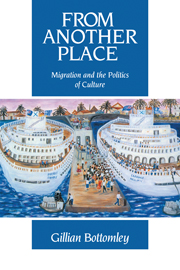Book contents
- Frontmatter
- Contents
- Preface and acknowledgements
- Part I Migration studies and the problem of culture
- Chapter 1 Migrations and cultural analyses: a point of departure
- Chapter 2 Comparative studies of migration, ethnicity, ‘race’ and culture in the U.S.A. and Britain
- Chapter 3 Traditions, structures and culture as process
- Part II Practising cultures
- Part III Constructing identities: gender, class, and ethnos
- Bibliography
- Index
Chapter 1 - Migrations and cultural analyses: a point of departure
Published online by Cambridge University Press: 05 November 2011
- Frontmatter
- Contents
- Preface and acknowledgements
- Part I Migration studies and the problem of culture
- Chapter 1 Migrations and cultural analyses: a point of departure
- Chapter 2 Comparative studies of migration, ethnicity, ‘race’ and culture in the U.S.A. and Britain
- Chapter 3 Traditions, structures and culture as process
- Part II Practising cultures
- Part III Constructing identities: gender, class, and ethnos
- Bibliography
- Index
Summary
… this is, after all, the century of the migrant as well as the century of the bomb, perhaps there have never been so many people who end up elsewhere than they began, whether by choice or by necessity, and so perhaps that's the source from which this kind of reconstruction can begin.
Salman Rushdie, 1987, p.63Culture is one of the most commonly used concepts in studies of migration, yet it is curiously unexplored. The notion of culture as a way of life of a particular group of people is obviously central to the process of migration, whereby people leave one set of social and historical circumstances and move, or are moved, to another. By this very movement, migration challenges the idea of a distinct way of life. If it is possible to transport whole ‘cultures’, then their specific conditions of development must be irrelevant. Clearly, this is not the case; anthropological work has long demonstrated the intricate inter-penetrations of economic, political, geographic and social conditions in cultural practices. The process of migration, therefore, calls into question such interrelations between circumstances and practices.
Much of the material about migration and its social consequences demonstrates the considerable difficulty of attempting to answer this question. For example, social scientists often assume that culture = ethnicity, that is, a defined national or linguistic category. Hence we read discussions about multiculturalism or cultural pluralism that concentrate only on ‘ethnics’, minorities within a state.
Information
- Type
- Chapter
- Information
- From Another PlaceMigration and the Politics of Culture, pp. 3 - 15Publisher: Cambridge University PressPrint publication year: 1992
